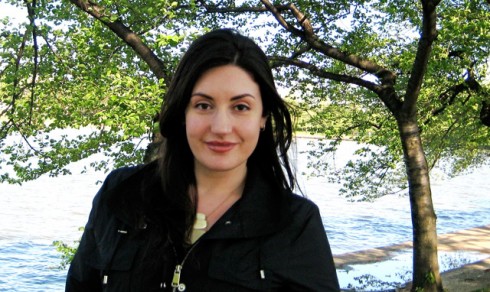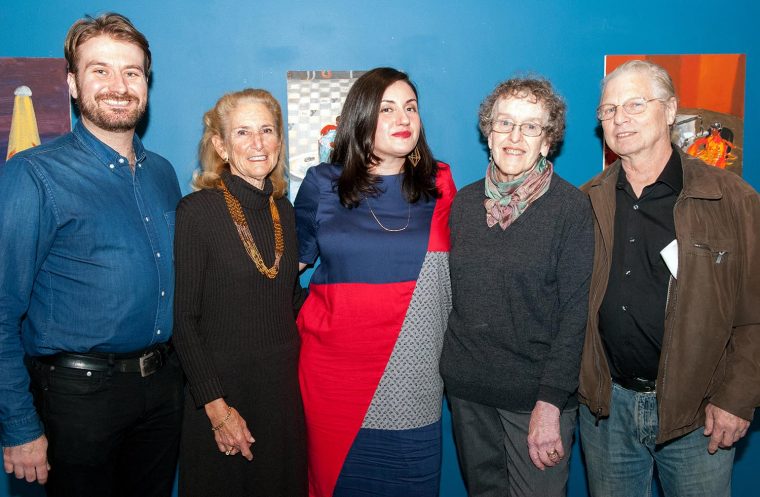On March 28, Victoria Smolkin, associate professor of history and chair, Russian, East European, and Eurasian studies, was featured on the radio station Echo of Moscow. Smolkin spoke on Soviet atheism on Irina Prokhorova's program "Culture of Everyday Life." The podcast is available in Russian online here. Smolkin is the author of A Sacred Space Is Never Empty: A History of Soviet Atheism, which was recently translated into Russian. Atheism prevailed in Soviet ideology, especially in the 1920s and 1930s. However, religion never fully disappeared from the life of Russia and the Soviet republics. In the broadcast, Smolkin and fellow panelists…
Associate Professor of History Victoria Smolkin's book, A Sacred Space Is Never Empty: A History of Soviet Atheism (Princeton University Press), was awarded an honorable mention for the 2019 Wayne S. Vucinich Book Prize. Established in 1983, the Wayne S. Vucinich Book Prize is sponsored by the Association for Slavic Studies, East European, and Eurasian Studies (ASEEES) and the Stanford University Center for Russian and East European Studies. It is awarded annually for the most important contribution to Russian, Eurasian, and East European studies in any discipline of the humanities or social sciences published in English in the United States…
In this recurring feature in The Wesleyan Connection, we highlight some of the latest news stories about Wesleyan and our alumni. Wesleyan in the News 1. CT Post: "Former Wesleyan Provost is First Woman President at Hobart and William Smith Colleges" Joyce Jacobsen, formerly Wesleyan's provost and senior vice president for academic affairs and the Andrews Professor of Economics, was inaugurated Oct. 18 as the first woman president of Hobart and William Smith Colleges. At the ceremony, the chairman of the HWS Board of Trustees said: “Dr. Jacobsen enters the presidency of Hobart and William Smith at a time of…
In this recurring feature in The Wesleyan Connection, we highlight some of the latest news stories about Wesleyan and our alumni. Wesleyan in the News 1. Inside Higher Ed: 'Safe Enough Spaces' President Michael Roth is interviewed about defending free speech, inclusion on campus, and affirmative action, among other topics, in connection with the forthcoming publication of his new book, Safe Enough Spaces: A Pragmatist's Approach to Inclusion, Free Speech, and Political Correctness on College Campuses, due out Aug. 20 from Yale University Press. 2. The New York Times: "The World's Smartest Chimp Has Died" William Griffin Professor of Philosophy Lori Gruen writes in…
From May 28 to May 30, Associate Professor of History Victoria Smolkin attended a conference in Rome, Italy, on the “Cultures of Unbelief," organized by the Nonreligion and Secularity Research Network and the Vatican’s Council on Culture. She spoke on "The Culture of Unbelief 50 Years On," which commemorates the 50th anniversary of the original “Culture of Unbelief” conference, organized in 1969 by the Vatican’s Secretariat on Non-Believers and the University of California, Berkeley. Her copanelists included Cardinal Gianfranco Ravasi, president of the Pontifical Council for Culture, and Andrew Copson, president of the International Humanist and Ethical Union. Professor of Theology and…
Wesleyan faculty frequently publish articles based on their scholarship in The Conversation US, a nonprofit news organization with the tagline, “Academic rigor, journalistic flair.” In a new article, Associate Professor of History Victoria Smolkin explains the historical context and significance today of a centuries-old religious dispute over Ukraine's Orthodox Church. Smolkin is also associate professor, Russian, Eastern European, and Eurasian Studies, and a tutor in the College of Social Studies. Why a centuries-old religious dispute over Ukraine's Orthodox Church matters today A new Orthodox Church was recently established in Ukraine. Shortly after, Bartholomew I, the Patriarch of Constantinople and the spiritual head…
On Nov. 11, Victoria Smolkin, associate professor of history and Russian, Eastern European, and Eurasian studies, joined forces with her brother, artist Vlad Smolkin, to share their work with the public at a new and revamped Main Street Gallery Art Opening/Books & Bagels Talk at Congregation Beth Shalom Rodfe Zedek in Chester, Conn. Smolkin is the author of a new book, A Sacred Space Is Never Empty: A History of Soviet Atheism, published by Princeton University Press in 2018. A scholar of Communism, the Cold War, and atheism and religion in Russia and the former Soviet Union, Smolkin’s expertise also…
In this recurring feature in The Wesleyan Connection, we highlight some of the latest news stories about Wesleyan and our alumni. Recent Wesleyan News Inside Higher Ed: "Career Path Intervention--Via a MOOC" An open online course by Gordon Career Center Director Sharon Belden Castonguay, which helps young people explore their interests and career options, is featured. 2. NPR: "Midterm Election Could Reshape Health Policy" (more…)
In this recurring feature in The Wesleyan Connection, we highlight some of the latest news stories about Wesleyan and our alumni. Recent Wesleyan News The New York Times Magazine: "Letter of Recommendation: Phyllis Rose's 'Parallel Lives'" Professor of English, Emerita Phyllis Rose's 1983 book Parallel Lives: Five Victorian Marriages, is featured in the New York Times Magazine. The book, which the reviewer notes she has re-read every few months recently, is a "group biography of several notable Victorians and their marriages," through which the reader can gain deeper insight into intimate relationships and societal change. Middletown Press: "Middletown Musician Noah Baerman Wins Guilford Performing Arts Fest…
In this recurring feature in The Wesleyan Connection, we highlight some of the latest news stories about Wesleyan and our alumni. Recent Wesleyan News The New York Times: Defending Conservatism, and Seeking Converts President Michael Roth '78 reviews Roger Scruton's new book on Conservatism, which he writes provides an "enlightening" background on a variety of important conservative thinkers, but stoops to scapegoating Muslims to "rally the troops." 2. Hartford Courant: First Group of Students Graduates from Wesleyan's Prison Education Program The first-ever Wesleyan Center for Prison Education Program graduation ceremonies, held in partnership with Middlesex Community College at York and Cheshire correctional institutions on…
Assistant Professor of History Victoria Smolkin was recently a guest on BBC Radio 4's "Beyond Belief" to discuss Soviet state atheism. Smolkin said that Lenin's conviction that banishing religion was necessary to create a revolutionary society was right ideologically, but wrong politically. "If they wanted to stay in power, they needed to accommodate religion, and they understood that," she said. "However, if they wanted to build a Communist society, ultimately religion had to go." (more…)
Participating in Kennesaw State University’s “Year of Russia” program, Assistant Professor of History Victoria Smoklin presented on the current state of US-Russia relations. KSU’s “Year of Russia” invites academics, artists and dignitaries “to promote a deeper appreciation for and understanding of Russia and its people.” During her presentation Smoklin discussed ideological struggle over national identity in contemporary Russia. She noted Russian President Vladimir Putin’s involvement in this struggle. His strategic engagement with his country’s history he has led to an unprecedented gain approval ratings. In particular, she cited Putin’s construction of a 54 foot tall statue of the 10th century…






